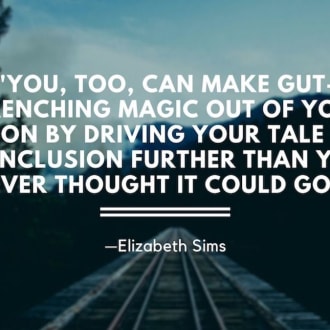
The Best Articles in Writing
The most useful articles and videos in Writing from around the web, curated by thought leaders and our community.
Refind focuses on timeless pieces and updates the list whenever new, must-read articles or videos are discovered.
Top 5 Writing Articles
At a glance: these are the articles that have been most read, shared, and saved in Writing by Refind users in 2024 so far.
Videos
Watch a video to get a quick overview.
Drawing for writers: Procreate 101
Even if you have never drawn before, we'll teach you how to draw and make your articles stand out using Procreate. Salman Ansari (https://letter.salman.io) a...
Writing Tips: The 6 Quickest Ways To Become A Better Writer
There are a lot of writing tips out there, but the ones I share here only take a minute to master and will help you become a better writer forever.It's an ex...
The Expert Behind Google’s Secret A.I. Writing Tool
Steven Johnson has studied software and AI-based tools for thought for more than 35 years. His consensus? Large Language models and human creativity aren’t a...
Everything You Need To Know About Becoming (Or Hiring) A Freelance Writer
This is a special “Flip the Script” episode! Instead of answering a guest’s questions, host Josh Spector brings on an expert he wants to learn from and asks ...
How to ...?
How to Write Concisely
It’s not the end of the world if you use an unnecessary word now and then, write the occasional overlapping sentence, or tell us what you’re doing in a sentence before you do it. But the extra words…
«But your readers don’t necessarily need to follow the journey you took while you were drafting the document. They just need to know where you ended up.»
How to Write Usefully
February 2020What should an essay be? Many people would say persuasive. That's what a lot of us were taught essays should be. But I think we can aim for something more ambitious: that an essay should…
«Useful writing tells people something true and important that they didn't already know, and tells them as unequivocally as possible.»
How to Develop Any Idea Into a Great Story
Even stories that start with brilliant strokes of inspiration too often fizzle out before we reach The End. Use this four-step method to develop your best ideas to their fullest.
«No matter your starting point—a love story, buddy tale, mystery, quest—you can do like the great innovators do: Bend it. Amp it. Drive it. Strip it.»
How to build a better writing habit August 8, 2019 In Creativity
I have written and published one new article on this blog every single week day for the past four weeks. That’s 20 articles in a month. These are not diary-style posts where I talk about my daily…
How to Write Anything
Rules you can use to write anything you want to write — from a book to a tweet
Trending
These links are currently making the rounds in Writing on Refind.
"Insecure vibes" are a self-fulfilling prophecy
When you feel nervous, you might give off subconscious signals that make people more suspicious. Get rid of insecure vibes—and your writing, meetings, and pitches will become stronger.
«Insecure vibes look like overcompensating. When we’re feeling self-conscious, we often express it in subtle ways we’re not even aware of.»
The Virtue of Slow Writers
As a writer at work on a book that’s taken far longer than expected, I’m interested in how, in a world that values speed, the slow writer...
«Write slowly and not only do you risk being forgotten, you may no longer be recognizable.»
Beware the Thorn of the Zéphirine Drouhin
Writers have long plotted murder mysteries in gardens of all sorts. What makes these fertile grounds for detective fiction?
Short Articles
Short on time? Check out these useful short articles in Writing—all under 10 minutes.
THE SECRET: Measure By Time, Not Output. — Carl Pullein
Author Jeffrey Archer flies out to Portugal each December to begin a seven-week writing marathon. Over the following few weeks, he will start writing at 6:00 am and will write throughout the day every…
The Written Word
Sep 26, 2023 SHARE ↓ A few thoughts I have about writing: Writing is an art, and art is subjective. Novelist William Maughan said there are three rules to good writing. “Unfortunately no one knows…
«Most good writing is a byproduct of good reading. You’ll never meet a good writer who doesn’t spend most of their time reading. Not some. Most.»
Writing with AI
When ChatGPT came out one year ago, we wanted to know whether and how it could be used for writing. We put it to the test.
«As writers we can not allow AI to replace our own thinking. We should use it to simulate the thinking of a missing dialogue partner. To write better, we need to think more, not less.»
Aldous Huxley's Deep Reflection
Huxley was a very special kind of expert witness to his own unusual states of consciousness, which he actively cultivated in the service of his writing.
How to Exclaim!
Noisy. Hysterical. Brash. The textual version of junk food. The selfie of grammar. The exclamation point attracts enormous amounts of flak...
Long Articles
These are some of the most-read long-form articles in Writing.
The Theorist Who Sees Math in Art, Music and Writing
The links between math, music and art have been explored for thousands of years. Sarah Hart is now turning a mathematical eye to literature.
My 12 Favorite Problems
A dozen things that drive my writing, research, thinking & actions
«battle against the constant pressure from powerful forces to narrow and constrain my life»
"You can only write at the speed of your own self-awareness."
Laurel Braitman on writing loss & self
What AI Teaches Us About Good Writing
While AI can speed up the writing process, it doesn’t optimize quality — and it endangers our sense of connection to ourselves and others.
«Good writers assess the rhetorical context for their writing and make deliberate decisions about where to conform and where to stray»
What does a happily ever after look like?
We looked at over 1,400 romance novel covers featured in Publishers Weekly from 2011 to 2023 and evaluated each cover based on its raunchiness (or level of undress), art style, and representation of…
Thought Leaders
We monitor hundreds of thought leaders, influencers, and newsletters in Writing, including:
What is Refind?
Every day Refind picks the most relevant links from around the web for you. Picking only a handful of links means focusing on what’s relevant and useful.
How does Refind curate?
It’s a mix of human and algorithmic curation, following a number of steps:
- We monitor 10k+ sources and 1k+ thought leaders on hundreds of topics—publications, blogs, news sites, newsletters, Substack, Medium, Twitter, etc.
- In addition, our users save links from around the web using our Save buttons and our extensions.
- Our algorithm processes 100k+ new links every day and uses external signals to find the most relevant ones, focusing on timeless pieces.
- Our community of active users gets the most relevant links every day, tailored to their interests. They provide feedback via implicit and explicit signals: open, read, listen, share, mark as read, read later, «More/less like this», etc.
- Our algorithm uses these internal signals to refine the selection.
- In addition, we have expert curators who manually curate niche topics.
The result: lists of the best and most useful articles on hundreds of topics.
How does Refind detect «timeless» pieces?
We focus on pieces with long shelf-lives—not news. We determine «timelessness» via a number of metrics, for example, the consumption pattern of links over time.
How many sources does Refind monitor?
We monitor 10k+ content sources on hundreds of topics—publications, blogs, news sites, newsletters, Substack, Medium, Twitter, etc.
Who are the thought leaders in Writing?
We follow dozens of thought leaders in Writing, including Stephen King, Grammar Girl is also @grammargirl@zirk.us, Darren Rowse, Madam Grammar, Merriam-Webster.
Missing a thought leader? Submit them here
Can I submit a link?
Indirectly, by using Refind and saving links from outside (e.g., via our extensions).
How can I report a problem?
When you’re logged-in, you can flag any link via the «More» (...) menu. You can also report problems via email to hello@refind.com
Who uses Refind?
450k+ smart people start their day with Refind. To learn something new. To get inspired. To move forward. Our apps have a 4.9/5 rating.
Is Refind free?
Yes, it’s free!
How can I sign up?
Head over to our homepage and sign up by email or with your Twitter or Google account.
Keep Learning
Learn something new, guided by experts. Deep Dives are carefully hand-curated series of time-tested articles and videos from around the web.
Get the big picture on your favorite topics.

















